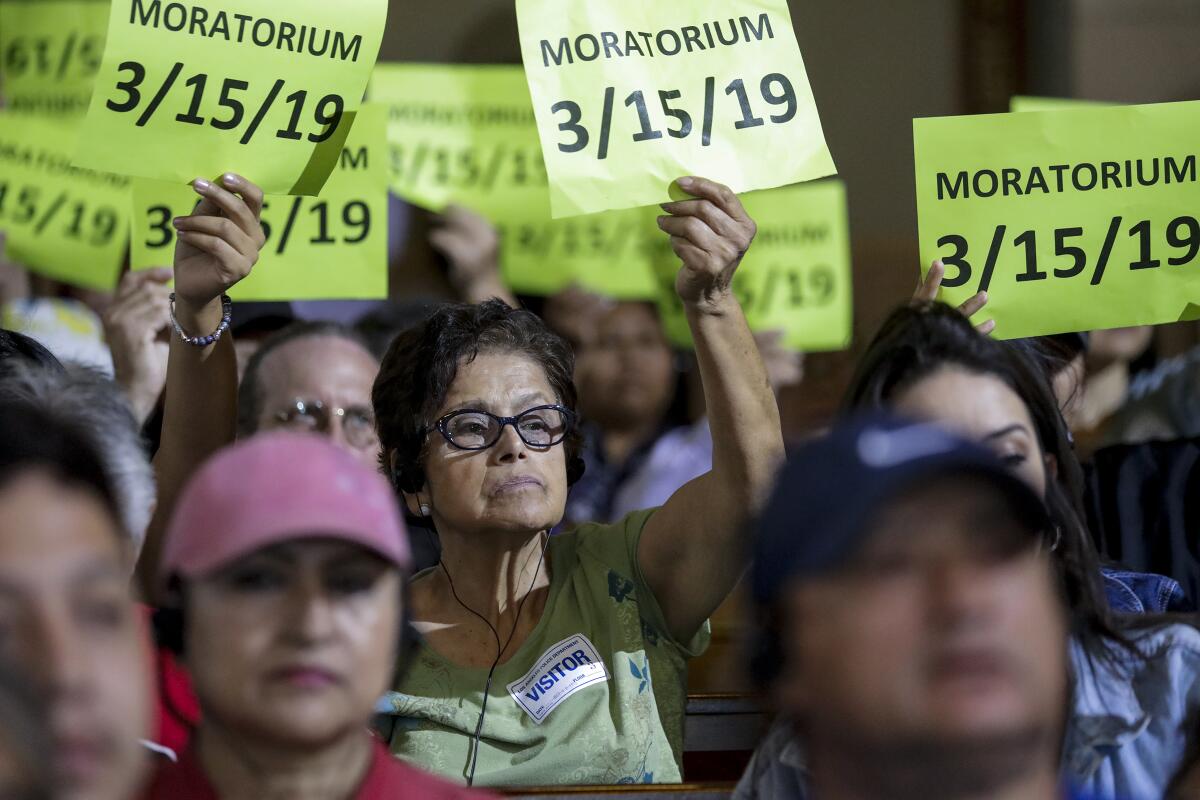Waiting for the cap on rents, California cities push back against ‘greedy’ landlords

Starting in January, a new state law will prohibit millions of California tenants from facing double-digit rent increases and being evicted unless they violate their leases.
But it’s not January yet.
In the interim, tenants across the state have been complaining that landlords are hiking their rents and issuing no-fault evictions before the law takes effect. And, in response, cities and counties have been passing emergency moratoria to stop it.
In the past six weeks, about three dozen local governments have approved rules to prevent evictions, according to a tally by Tenants Together, a renter advocacy group.
The state’s largest city, Los Angeles, passed an ordinance and so has Inyo County’s Bishop, which has a population of 3,700. Elected officials taking action span California, from Menlo Park and Milpitas in the Bay Area, to Alhambra and Redondo Beach in Southern California, to Madera and Stockton in the Central Valley.
“We couldn’t just sit around,” said Michael Cacciotti, a member of the South Pasadena City Council, which passed an anti-eviction measure earlier this month. “Whether we’re going to be sued or not remains to be seen. But this was impacting lots of people in our community.”
One of them was USC graduate student Rachel Hamilton, who received a notice on Halloween telling her to leave the two-bedroom apartment she has shared with her 12-year-old son for more than three years. She pays $1,750 a month and said the past few weeks have been terrifying.
“It just felt like a punch to the gut, this whole time,” said Hamilton, 31. “The feeling still hasn’t gone away.”
In October, Gov. Gavin Newsom signed Assembly Bill 1482, which will limit annual rent increases to 5% plus inflation for the next decade and will prevent no-fault evictions for tenants who have lived in apartments for at least a year.
The governor and state lawmakers argue that it will stop tenants from receiving exorbitant rent hikes that could force them from their homes — an event that, in growing number of cases, is leading to homelessness.
They also contend that the new rules, which allow for rent hikes that surpass wage growth, will still let landlords turn a profit. Single-family home and condominium rentals are exempt from the new law — unless they’re owned by corporations — as are apartments built within the last 15 years.
State laws typically take effect the January after being signed, in this case leaving a nearly three-month gap. If there is an urgency clause, a law can go into effect immediately, but that requires passage by a two-thirds supermajority in both houses of the Legislature and the rent cap fell far short of that margin.
Assemblyman David Chiu (D-San Francisco), the law’s author, said he anticipated that landlords might try to beat the clock.
While landlords are allowed to increase rents by whatever they’d like now, come next year, the law requires them to reduce the rent to whatever it was in March 2019 — when he introduced the bill — plus the allowable increase under the new cap, which is 8.3% in the Los Angeles area. For instance, if a landlord in Los Angeles raised a tenant’s rent from $2,000 a month to $2,500 a month over the summer, it would have to be reduced to $2,166 in January.
Chiu said there wasn’t a similar mechanism for rolling back evictions, given that there might be a new tenant in an apartment come January.
“These landlords are making a cruel choice to evict their tenants,” he said. “Our law is not forcing them to be greedy. They were always greedy and they’re showing their true colors.”
Dennis Block, a prominent attorney for landlords in Los Angeles, argues the opposite. Last month, he spoke at a Los Angles landlord conference, advocating for rent hikes and evictions before the new law takes effect as a way to protect landlords’ property from artificial limits on their investments.
“The governor of the state of California and our wonderful state Legislature created a situation where they’re telling landlords to evict tenants,” Block told The Times. “Any problems that tenants are having, they should talk to their legislators who created this insanity.”
In South Pasadena, Hamilton, the USC graduate student who received an eviction notice, also received notice of a 7% rent hike for what would have been her final month in the complex. Since then, Hamilton said she has experienced recurring nightmares, had no choice but to skip classes to research her options for new housing and contemplated living in her car. Hamilton lives off money from student loans and a part-time job, and said she is worried about having to find a new school for her son, who has special needs.
She found out that other South Pasadena tenants were facing eviction on the social network Nextdoor and, together, they pushed City Council members to pass the moratorium. She’s hoping it will allow her to stay in her apartment.
The property management company for Hamilton’s complex, Trumark Real Estate, referred questions about the situation to Block.
There aren’t good statistics for no-fault evictions in California, so it’s unclear how many there have been since the rent cap bill was approved. Daniel Yukelson, executive director of the Apartment Assn. of Greater Los Angeles, said he doesn’t believe there have been mass evictions in response to the law, arguing that it’s not in landlords’ benefit to spend significant time and resources pushing tenants out except as a last resort.
He contended that city councils are pandering to renters in passing the moratoria.
“Suddenly the American Dream is looked at as negative,” Yukelson said. “The way that people have achieved wealth in this country is investing in property. People in California who have done that are now looked down upon. It’s a shame.”
Some tenants’ rights advocates have called on Newsom to issue a statewide eviction moratorium rather than relying on cities and counties to do it themselves. Newsom spokesman Jesse Melgar did not address that request in a statement, but encouraged tenants to seek legal services if they believe they’ve been targeted.
The current evictions are exactly why the state needed the new rent cap law, Melgar said.
“These unscrupulous landlords, who are using the specter of new tenant protections to push out tenants, are prime examples of the stain these laws are designed to erase,” Melgar said.
More to Read
Sign up for Essential California
The most important California stories and recommendations in your inbox every morning.
You may occasionally receive promotional content from the Los Angeles Times.











